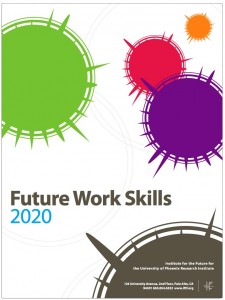In many ways, students are the products of educators. If a school or university system consistently produces artistic, scientific, business, and community leaders, then it’s safe to say that the system is serving society well. So, it only makes sense that educators need to examine (and endlessly re-examine) what students are being taught. Thus, there’s probably no better way to begin a new year of nextsensing blog posts than by pointing you to “10 Competencies Students Need To Thrive In The Future” [link].
 As it sounds, this is an examination of the ten most important skills students need in order to succeed. The source for these 10 skills is Future Work Skills 2020, a study conducted by the Institute for the Future for the University of Phoenix Research Institute [link].
As it sounds, this is an examination of the ten most important skills students need in order to succeed. The source for these 10 skills is Future Work Skills 2020, a study conducted by the Institute for the Future for the University of Phoenix Research Institute [link].
Each of the 10 skills is worth your attention; but, I would especially point out what the report says about “sense-making”. It’s actually #1 on the list! The report recognises that technology will continue to increase its presence in everyone’s life. However: “A computer may be able to beat a human in a game of chess or Jeopardy by sheer force of its computational abilities, but if you ask it whether it wants to play pool, it won’t be able to tell whether you are talking about swimming, financial portfolios, or billiards.” In other words, it takes a human to make sense of a complex world.
Yet the 10 skills listed for students are, for me, needed by everyone.
Disruptive ambiguity, the state of mind in which the future path is unclear mainly because so little makes sense, is pervasive. And sense-making is, in reality, a set of skills. Nextsensing is, in effect, a process and set of tools for making sense of future-tense opportunities so you can act upon them today. Identifying the requisite competency framework and corresponding skills that will help executives and their organisations become more effective in dealing with disruptive ambiguity is critically important, which is why it is the subject of a forthcoming e-book I am beginning to draft.
To me, the 10 competencies profiled in this report strongly indicate that nextsensing needs much more research by many more people. And I have found that nextsensing is a competency that requires a commitment encompassing the entire ecosystem of an organisation to be effective. (If students can begin mastering that competency now, so much the better.)
A new year begins. How should you align with this new start?
While many of the skills and competencies needed for successfully dealing with future-tense challenges and opportunities already exist within your organisation, what is required from leaders is to reorient those competencies explicitly toward unlocking future-tense opportunities. This is not about starting over; rather, it’s about resetting priorities. You will maximise the potential for 2014 only if you define, now, the strategic necessities that will create the most value for your current and potential customers over the next 12 months. More than likely, this means that your firm will need to change how it creates value.
In other words, your strategy will be influenced more and more by your organisations’s capacity to “learn its way forward” in a world in which making sense of things and renewing your organisation’s identity accordingly is paramount.
I recall Alvin Toffler’s special perspective: “The illiterate of the 21st century will not be those who cannot read and write, but those who cannot learn, unlearn, and relearn.”
Or, as the report phrased it: “A new generation of organisational concepts and work skills is coming not from traditional management/organisational theories but from fields such as game design, neuroscience, and happiness psychology. These fields will drive the creation of new training paradigms and tools.”
The time for nextsensing has arrived.
